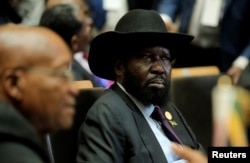An employee of South Sudan's embassy in Washington says the embassy owes him more than a year's back salary — another indication of mounting financial problems for the war-ravaged country's government.
In January, South Sudan closed its embassy in London after not paying rent on the building for five months.
There is no sign South Sudan's embassy in Washington will go the same route, but its driver, Manyok Lual, suggests the embassy is having cash flow problems.
In an interview with VOA's South Sudan in Focus, Lual, 44, said employees of the embassy went a year without getting paid until this month, when diplomats received two months of salary arrears and local employees like himself received one month.
"They say we don't have money in the country, the country is at war now ... and just hang on, when we get the money, we will pay you. And it is quite a long time without getting paid," Lual said.
Multiple sources at the embassy say the country has been paying its rent, but sometimes delays its payments by three to five days.
The administrator at South Sudan's embassy, Dombek Yai Kuol, declined to comment on Lual's accusations, saying he needs time to contact officials at South Sudan's ministry of foreign affairs and international cooperation.
Gordon Buay, the deputy head of mission at the embassy, told VOA last year that the embassy uses money collected for issuing visas to pay its employees.
Civil war
South Sudan has large oil deposits but exports have drastically slowed since the country plunged into civil war more than four years ago, with President Salva Kiir's government fighting rebels led by his former deputy, Riek Machar. Each side blames the other for violating a 2015 peace agreement and a 2017 cease-fire.
This week, Kiir fired his finance minister, Stephen Dhieu Dau, and appointed Salvatore Garang Mabiordit as the country's new finance minister.
During a swearing-in ceremony Tuesday, Kiir told the new minister to devise ways to revive the country's economy.
"We have no money in our banks and we have nothing at all and we have become a laughing stock,'' the president said. "We have lost the value of our currency and there is nothing that we can do soon to regain our currency's value."
U.S. labor laws
Lual is a former South Sudanese refugee who came to the U.S. in 2001 and is now a U.S. citizen. He says that after getting one month's pay, he is still owed about $47,000.
To financially survive, he says, he has to work extra hours driving customers for transportation services Lyft and Uber, and sometimes operates on as little as one or two hours sleep per night.
He says that when he asked Ambassador Garang Diing about the money, the ambassador told him to file a lawsuit.
"He replied, 'if you need your money, go to court and we will meet in court,'" Lual said.
Richard Renner is an attorney at Kalijarvi, Chuzi, Newman & Fitch, a Washington law firm that specializes in employment issues. He said American citizens and U.S. permanent residents working at the South Sudanese embassy are governed by U.S. laws.
"For [embassy] employees who are not performing policy-making roles, what we call civil servants of a foreign government, then they will be commercial employees and they would be subject to U.S. laws and have the rights to insist on payment of minimum wages or other remedies for non-payment," Renner said.
He said an aggrieved party should first make a written demand for payment.
"In this type and most legal cases, it is helpful to have a document trail to show that you asked the other party to come to compliance with the law," Renner said.
He said diplomats are immune from liability for their actions in the United States. However, that does not apply to the foreign government itself.
"If the claim is against the South Sudanese government, that claim can be asserted for the government's [South Sudan] commercial activities here in the United States," Renner said.







